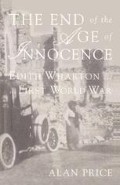Abstract
the war was over, but its effects would be with edith wharton for the rest of her life. Through the months following the Armistice, she gradually disengaged herself from the remaining charities. She was able to return to her first love—writing. She established a rhythm: St. Brice during the summer and fall and Hyères during the winter and spring, and a book every year. The noise and human bustle of Paris during the peace conference and into the 1920s with the arrival of Americans from “the lost generation” poisoned the city for her. She made her separate peace with the world and withdrew to her homes and gardens and friends.
Access this chapter
Tax calculation will be finalised at checkout
Purchases are for personal use only
Preview
Unable to display preview. Download preview PDF.
Notes
Wharton to Bernard Berenson, January 27, 1919, Yale, also in The Letters of Edith Wharton, eds. R.W.B. Lewis and Nancy Lewis. New York: Charles Scribner’s Sons, 1988, 421.
Quoted in the introduction by R.W.B. Lewis and Nancy Lewis, “Part Six: The Costs of Energy, 1919–1927.” The Letters of Edith Wharton, eds. R.W.B. Lewis and Nancy Lewis. New York: Charles Scribner’s Sons, 1988, 417.
Edith Wharton, French Ways and Their Meaning, (New York: D. Appleton and Company, 1919), 16–17.
Ibid., 100–101.
Shari Benstock, No Gifts from Chance: A Biography of Edith Wharton (New York: Charles Scribner’s Sons, 1994), 343, 374.
Stanley Cooperman, World War I and the American Novel (Baltimore: Johns Hopkins University Press, 1967), 19–20.
Ibid., 41.
Ibid., 97.
Cynthia Griffin Wolff, A Feast of Words: The Triumph of Edith Wharton (New York: Oxford University Press, 1977), 407. In her appendix, “The Dating of the ‘Beatrice Palmato’ Fragment,” Wolff has persuasively argued that “the fragment was written in 1918 or 1919.”
Judith Sensibar in an insightful essay on A Son at the Front has explored the homoeroticism in the novel. See her ‘“Behind the Lines’ in Edith Wharton’s A Son at the Front: Re-Writing a Masculinist Tradition” in Wretched Exotic: Essays on Edith Wharton in Europe, eds. Katherine Joslin and Alan Price (New York: Peter Lang, 1993), 241–256.
Paul Fusse 11 in his chapter “Soldier Boys” in The Great War and Modern Memory (New York: Oxford University Press, 1975), 270–309.
Edith Wharton, The Marne (New York: D. Appleton and Company, 1918), 22–23.
Ibid., 23.
Ibid., 33–34.
Ibid., 58–60.
Edith Wharton, A Son at the Front (New York: Charles Scribner’s Sons, 1923), 128–129.
, 171.
, 171.
, 187–188.
, 229–230.
v, 255.
, 258.
, 314.
, 325.
, 333.
, 366.
Edith Wharton, The Mother’s Recompense (New York: D. Appleton and Company, 1925), 12.
Copyright information
© 1996 Alan Price
About this chapter
Cite this chapter
Price, A. (1996). Conclusion The End of the Age of Innocence. In: The End of The Age of Innocence. Palgrave Macmillan, New York. https://doi.org/10.1007/978-1-137-05183-7_7
Download citation
DOI: https://doi.org/10.1007/978-1-137-05183-7_7
Publisher Name: Palgrave Macmillan, New York
Print ISBN: 978-0-312-17677-8
Online ISBN: 978-1-137-05183-7
eBook Packages: Palgrave Literature & Performing Arts CollectionLiterature, Cultural and Media Studies (R0)

